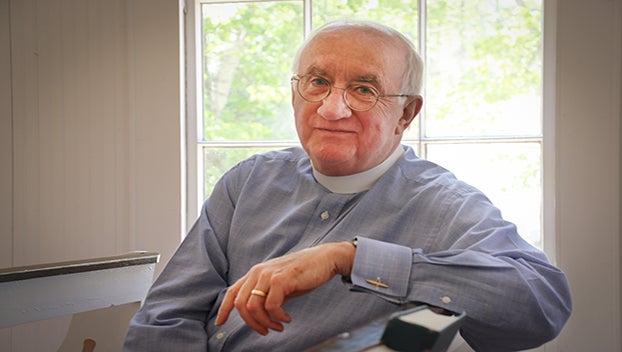The benefits of praying often
Published 4:49 pm Monday, August 12, 2024

- Reverend Alan Neale (Holly Morgan/WDN)
|
Getting your Trinity Audio player ready...
|
By Alan Neale
As I was thinking about this month’s column, the matter of prayer kept surfacing in my mind. And then, surely not a coincidence, in one of my morning devotional books I read wise words about prayer written by Bill Wilson in the late 1930’s.
Writing of “coincidence” makes me remember a famous quotation by Professor C.S. Lewis. After the professor became a Christian, gave his life to Christ, his fellow professors often made fun of him and ridiculed him. “Oh,” they would say, “your answers to prayer are not answers, they are only coincidences.” Professor Lewis would always respond, “You may well be right, but it seems to me that coincidences happen more often when I am praying, and less often when I am not praying.”
Bill Wilson recognized that often prayer was thought not very important, “something not really necessary… it might help in an occasional emergency but… was a somewhat mysterious skill of clergymen.” Much truth there except ministers of the church can claim no special skill in prayer; in fact, sometimes they can get so busy with the things of God that they forget the person of God – but that is for another day. Over the years, I have often heard people refer to “tea-bag prayers” – only of real use in “hot water.”
In his writing, Bill Wilson went on to define three benefits for those who pray often: “they find strength not ordinarily their own. They find wisdom beyond their usual capability. And they increasingly find a peace of mind which can stand firm in the face of difficult circumstances.” I suspect that in these horrible and scary days of storm and flooding, many have found their practice of prayer giving strength, wisdom, and serenity. What a tremendous gift.
Over decades I have met hundreds and hundreds of people for whom prayer is a vital part of living; I have also met a few people (including me) who feel that we pray enough. These practitioners of prayer use a myriad of ways to pray… beginning with Father, Son, Spirit, Lord, Shepherd and many more. These practitioners of prayer will tend to use formal written prayers or will nurture a spontaneity of prayer – or both.
I know some who have used the acronym ACTS for their pattern of prayer – Adoration, Confession, Thanksgiving, Supplication. Or, spiritual lives vary so much from person to person, CATS – Confession, then Adoration, Thanksgiving and Supplication.
When I began going to church (when I was twelve in London), the church was using Prayer Books filled with language of the 17th century. It must have seemed so very strange to this London lad but, after a while, what made an impact on me was not the language, but the reality of the Lord’s presence experienced in community.
One of the blessings, I find, in my denomination of choice (Episcopal) is that I regularly use prayers that have been said by countless brothers and sisters in Christ over the centuries – this deepens my sense of fellowship with all the saints who have gone before. But using these prayers also deepens my sense of fellowship with all the saints throughout the world – here is a fellowship and community unfettered by time or by space.
Sometimes, if not often, we find that prayer needs the support and encouragement of others. The famous story of the sick man let down through the roof, reminds the reader of the importance of the friends who “carried him to Jesus” – sometimes we need ask our friends to “carry us in prayer to Jesus.”
To intrigue others, I will often say “I do not believe in prayer” but I do believe in the Lord who answers prayer. Prayer requires no magic, no incantation – prayer requires a vision of the loving Lord who cares for us and for all the cares that burden us.
Forgive me, but I end with a prayer from the 17th century (and originally, long before). I believe it is a powerful and eloquent prayer that says about our God, ourselves, and our relationship with the divine.
O God, the protector of all who trust in you, without whom nothing is strong, and nothing is holy. Increase and multiply upon us your mercies; that with you as our ruler and guide, we may pass through things temporal that we lose not the things eternal, through Christ our Lord, Amen. Alleluia.
Alan Neale is the Rector of Zion Episcopal Church in Washington.





